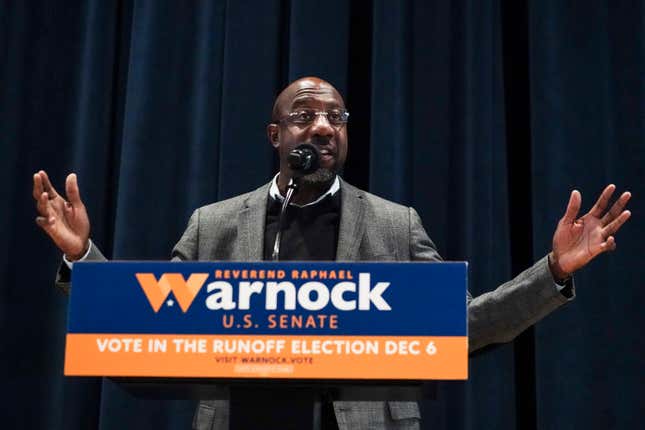
The state of Georgia has 10 historically Black colleges. Seven of those schools are private, meaning they don’t get the majority of their funding from state government and they aren’t under the supervision of the University of Georgia system.
It also means thousands of Black college students who might otherwise be eligible to vote in Georgia, including in tomorrow’s key runoff election for a U.S. Senate seat, won’t be allowed to run based on a law that dates back almost two decades, according to an NBC News report.
Georgia is one of several states that since the 2020 presidential election has passed laws that critics say are aimed at suppressing Black and Hispanic voter turnout, largely because those groups tend to vote Democratic and Republicans control the state legislature, which sets voting policy. But this specific measure is 16 years old, predating the 2021 voting law signed by Georgia’s Republican Gov. Brian Kemp. It doesn’t explicitly forbid out-of-state students from voting in Georgia, but it says that students at private colleges can’t use their university issued student IDs as proof of address when registering or at the polls.
Since IDs from Georgia’s public universities are considered state-issued, they can be used for voting. That means that the 40,000 students enrolled at Georgia Tech or the 30,000 students at the University of Georgia could theoretically vote in Georgia even if they matriculated from out of state or go home between semesters, while the roughly 10,000 students enrolled in the Atlanta University Center institutions (Clark Atlanta University, Spelman University, Morehouse College and the Morehouse School of Medicine), can’t vote in Georgia unless they obtain a state issued ID, which in some cases is impossible.
From NBC News
“You have a lot of students who came from cities like Philadelphia, or New York and they never needed a driver’s license or had a state ID in their state,” said Sylvester Johnson, an Atlanta-area organizer with the group. He noted that the only form of photo ID some he’d talked with on various Atlanta campuses currently had was their student ID from the private HBCU they were enrolled in.
“These are the kind of students who are affected,” he said.
Johnson and his team of volunteers have been combing the seven private HBCU campuses across the state in recent weeks reminding students what they must bring when they cast their ballot in person.
Tomorrow’s runoff between Democratic incumbent U.S. Sen. Raphael Warnock and Republican challenger Herschel Walker is considered crucial even though last month’s midterm elections already saw voters decide that Democrats will retain control of the Senate. If Warnock wins, he party gains a slightly larger margin that it can use to push forward legislation, while a Walker victory would make that road tougher.
And college students’ votes could make all the difference in a race where polls show Warnock currently holding a slim lead. Young voters and people of color—by definition categories that overindex on private, HBCU campuses, were critical to Warnock’s first victory back in 2020.

